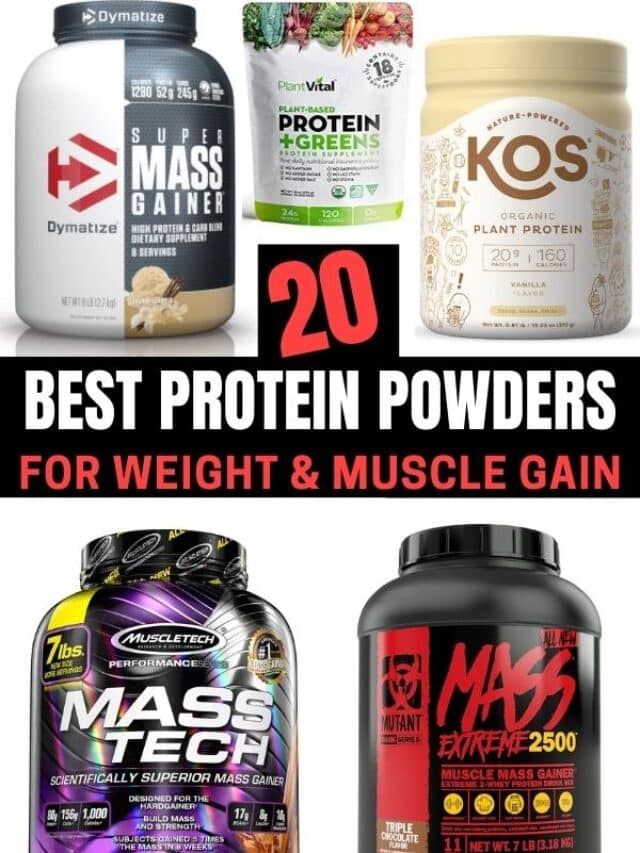The Ultimate Guide To Choosing The Best Protein Powder For Muscle Gain
The Ultimate Guide to Choosing the Best Protein Powder for Muscle Gain
Related Articles
- Unleashing Your Fitness Potential: The Ultimate Guide To Using A Fitness Planner For Success
- Fitness Journey Transformation Stories To Inspire You: From Couch Potato To Marathon Runner And Beyond
- Building Healthy Habits In Fitness: Unveiling The Secrets To Lasting Success
- Step-by-Step Guide To Starting A Fitness Routine: Unlock Your Potential
- Unlock Your Full Potential: The Ultimate Guide To Flexibility Training
Introduction
Uncover insights to start or boost your journey with The Ultimate Guide to Choosing the Best Protein Powder for Muscle Gain.
The Ultimate Guide to Choosing the Best Protein Powder for Muscle Gain

Gaining muscle mass requires a multifaceted approach encompassing consistent training, proper nutrition, and adequate rest. While exercise stimulates muscle growth, protein provides the essential building blocks – amino acids – necessary for repairing and rebuilding muscle tissue after workouts. Protein powder acts as a convenient and efficient way to supplement your daily protein intake, accelerating muscle growth and recovery. However, navigating the vast world of protein powders can be daunting. This comprehensive guide will equip you with the knowledge to choose the best protein powder for your muscle-building goals.
1. Understanding Protein Sources and Their Benefits
The effectiveness of a protein powder hinges largely on its source. Different protein sources offer varying amino acid profiles, digestibility rates, and overall biological value. Let’s examine some of the most popular options:
Whey Protein: Derived from milk, whey is a complete protein, meaning it contains all nine essential amino acids your body cannot produce on its own. It’s rapidly digested, making it ideal for post-workout consumption when your muscles are most receptive to protein synthesis. Whey comes in several forms:
- Whey Concentrate: A more economical option, containing a slightly lower protein content and higher lactose levels compared to isolate.
- Whey Isolate: Undergoes further processing to remove lactose and fat, resulting in a higher protein concentration and lower carbohydrate content. Ideal for those with lactose intolerance or seeking a cleaner protein source.
- Whey Hydrolysate: Pre-digested whey protein, offering the fastest absorption rate. This is beneficial for individuals needing rapid protein delivery after intense training.

Casein Protein: Also derived from milk, casein is a slow-digesting protein. Its gradual absorption provides a sustained release of amino acids over several hours, making it ideal for nighttime consumption to minimize muscle protein breakdown during sleep.
Soy Protein: A plant-based complete protein, soy protein is a popular alternative for vegetarians and vegans. It offers a good amino acid profile and is relatively affordable. However, some individuals may experience digestive discomfort or have concerns about its potential impact on hormone levels.
Brown Rice Protein: A plant-based protein source with a lower amino acid profile compared to whey or soy. It’s hypoallergenic and generally well-tolerated, making it a suitable option for those with sensitivities. It often needs to be combined with other protein sources for optimal results.
Pea Protein: Another plant-based option, pea protein is hypoallergenic and easily digestible. Like brown rice protein, it may be less complete in its amino acid profile and benefit from combination with other sources.
Egg Protein: Derived from egg whites, egg protein is a complete protein with excellent digestibility and a high biological value. It’s a solid choice but may be less convenient and more expensive than whey.
2. Determining Your Protein Needs for Muscle Gain
The amount of protein you need depends on several factors, including your weight, activity level, and training intensity. A general guideline for muscle gain is to consume 1.6-2.2 grams of protein per kilogram of body weight (0.73-1 gram per pound). For example, a 70kg (154lb) individual aiming for muscle gain should consume between 112-154 grams of protein daily. Protein powder can help you reach this target, but it shouldn’t replace whole-food protein sources like meat, fish, eggs, and legumes.
3. Assessing Protein Powder Quality and Purity
Not all protein powders are created equal. Look for products that:
- Clearly state the protein source and amount: Avoid ambiguous labeling. The protein content should be prominently displayed on the nutrition facts panel.
- Have third-party testing verification: Companies like Informed Sport or NSF Certified for Sport ensure the product is free from banned substances and accurately reflects the label claims.
- Are free from artificial sweeteners, flavors, and additives: Choose products with minimal processing and natural ingredients whenever possible.
- Specify the amino acid profile: While not always readily available, knowing the amino acid profile helps assess the protein’s quality and completeness.
4. Choosing the Right Protein Powder for Your Needs
The best protein powder for you will depend on your individual preferences, dietary restrictions, and training goals. Consider the following:
- Lactose intolerance: If you’re lactose intolerant, opt for whey isolate, casein hydrolysate, soy protein, brown rice protein, pea protein, or egg protein.
- Vegan or vegetarian diet: Choose soy protein, brown rice protein, pea protein, or a blend of plant-based proteins.
- Budget: Whey concentrate is generally the most affordable option, while whey isolate and hydrolysate are more expensive.
- Digestibility: Whey protein is generally well-tolerated, but some individuals may experience digestive issues. If this is a concern, consider casein or plant-based options.
- Taste and mixability: Protein powders come in various flavors and textures. Choose one that you enjoy and that mixes easily with water or other liquids.
5. Optimizing Protein Powder Intake for Muscle Growth
To maximize the benefits of protein powder for muscle growth, follow these tips:
- Consume protein powder post-workout: This is crucial for replenishing muscle glycogen stores and initiating muscle protein synthesis.
- Spread protein intake throughout the day: Don’t rely solely on protein powder for your daily protein intake. Combine it with whole-food sources.
- Pair protein powder with carbohydrates and healthy fats: This enhances nutrient absorption and promotes muscle recovery.
- Stay hydrated: Adequate hydration is essential for protein synthesis and overall health.
- Consider your individual needs: Experiment with different protein sources and timings to find what works best for you.
6. Tips and Tricks for Maximizing Results
- Experiment with different brands and flavors: Find a protein powder you genuinely enjoy to ensure consistent consumption.
- Read reviews: Check online reviews to get an idea of other users’ experiences with different protein powders.
- Don’t rely solely on protein powder: Prioritize whole-food protein sources as the foundation of your diet.
- Combine with resistance training: Protein powder is most effective when combined with a consistent resistance training program.
- Monitor your progress: Track your weight, body composition, and strength gains to assess the effectiveness of your protein powder and training regimen.
- Adjust your intake based on your needs: As you progress, you may need to adjust your protein intake to meet your evolving requirements.
- Consider a pre-workout protein shake: A smaller shake with fast-digesting protein can provide an immediate boost of amino acids before intense workouts.
7. Progression of Tips and Tricks
As you become more experienced with protein powder and muscle-building, your approach will likely evolve. Initially, you might focus on simply meeting your daily protein requirements. As you progress, you might experiment with different protein sources, timings, and combinations to optimize muscle growth and recovery. You might also incorporate advanced techniques like protein cycling (varying protein intake throughout the week) or periodized nutrition (adjusting your intake based on your training phases). The key is to continuously learn and adapt your approach based on your individual progress and needs.
Conclusion
Choosing the right protein powder is a significant step towards achieving your muscle-building goals. By understanding the various protein sources, assessing your individual needs, and following the tips outlined in this guide, you can effectively utilize protein powder as a valuable tool in your fitness journey. Remember, consistency and a holistic approach that encompasses proper training, nutrition, and rest are crucial for optimal results. Don’t hesitate to consult with a registered dietitian or certified personal trainer for personalized guidance.
Frequently Asked Questions (FAQs)
Q: Can I gain weight without protein powder? A: Yes, you can absolutely gain weight and build muscle without protein powder. It’s a supplement, not a necessity. Focus on consuming enough protein from whole foods.
Q: Is it okay to use protein powder every day? A: Yes, daily use is generally safe for most healthy individuals, provided you don’t exceed the recommended daily intake and maintain a balanced diet.
Q: Can protein powder cause digestive problems? A: Some individuals may experience bloating, gas, or diarrhea, especially with whey protein. Choosing a different protein source or a lower dose might alleviate these issues.
Q: How much water should I mix with my protein powder? A: The amount of water varies depending on the protein powder and your personal preference. Start with the recommended amount on the label and adjust to achieve your desired consistency.
Q: When is the best time to take protein powder? A: Post-workout is ideal, but you can also consume it at other times throughout the day to help meet your daily protein requirements.
Q: Can I use protein powder for weight loss? A: While primarily known for muscle gain, protein powder can support weight loss by increasing satiety and boosting metabolism. However, it’s crucial to combine it with a calorie deficit and a balanced diet.
Source URL: [Insert a relevant URL here, e.g., a reputable health or fitness website discussing protein powder.] (Please replace this bracketed text with an actual URL)
Closure
We hope this article has provided valuable insights into The Ultimate Guide to Choosing the Best Protein Powder for Muscle Gain. Stay with us for more tips on fitness and wellness!
Let us know your thoughts on The Ultimate Guide to Choosing the Best Protein Powder for Muscle Gain in the comments below.
Keep up with our latest fitness and wellness content!




